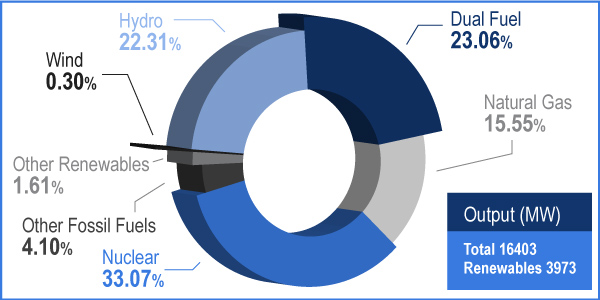By Michael Kuser
NYISO, PJM Win JOA Waiver Request
FERC last month granted NYISO and PJM a waiver of their joint operating agreement, allowing the two grid operators to add the East Towanda-Hillside tie line as a market-to-market flowgate (ER18-2442), Rana Mukerji, senior vice president for market structures, told the Business Issues Committee on Wednesday in presenting the monthly Broader Regional Markets report.
The temporary waiver permits NYISO Business Issues Committee Briefs: Oct. 10, 2018.)
The commission’s ruling also required the grid operators “to submit quarterly reports regarding the status of JOA revisions to implement a long-term solution.”
Reference Level Manual Changes
The BIC approved changes to three sections of the Reference Level Manual to comply with FERC Order 831.
Mitigation References Supervisor Giacinto Pascazio told the BIC the sections dealt with fuel-cost adjustments (FCAs), FCAs with generator bids in excess of $1,000/MWh and reference level development for demand-side resources.
The changes provide generators the ability to reflect updated fuel information to the ISO, which then automatically screens the FCA.
The ISO will reject energy offers above $1,000/MWh that lack FCAs. The changes also establish an FCA process for generators that do not burn oil or natural gas.
Validated cost-based reference levels from $1,000 to $2,000/MWh will serve as the bid cap, and any demand-side resource wishing to bid in excess of $1,000/MWh must initiate a consultation with the ISO 30 days prior to the start of the capability period.
A demand-side resource’s cost to reduce load should align with its discounted net revenues in the immediate future.
Real-time Market Settlements Clarifications
The BIC unanimously approved Tariff changes clarifying real-time market settlements and their interaction with energy storage resources (ESRs). ISO staffer Christopher Brown told the BIC that the changes — which are subject to approval by the ISO’s Management Committee later this month and by the Board of Directors in January — do not affect calculations or require software modifications.
Energy imbalance payments and charges address the differences among actual energy injections or withdrawals and real-time and day-ahead energy schedules.
The changes apply to ESRs injections and withdrawals and include terms that were introduced and defined in the ISO’s FERC Order 841 compliance filing submitted Dec. 3 (ER19-467). (See RTOs/ISOs File FERC Order 841 Compliance Plans.)
Natural Gas Prices Up 45% in November
NYISO locational-based marginal prices averaged $43.15/MWh in November, up just over 20% from October and 52% from the same month a year ago, Mukerji said in his monthly operations report. Day-ahead and real-time load-weighted LBMPs came in higher compared to October.
Year-to-date monthly energy prices averaged $45.11/MWh in October, a 30% increase from a year ago. November’s average sendout was 411 GWh/day in November, compared with 399 GWh/day in October and 403 GWh/day a year earlier.
Transco Z6 hub natural gas prices averaged $4.23/MMBtu for the month, an increase of 45.4% over October and 44.8% from a year ago.
Distillate prices dropped compared to the previous month but were up 9.3% year-over-year. Jet Kerosene Gulf Coast averaged $14.50/MMBtu, down from $16.65 in October. Ultra Low Sulfur No. 2 Diesel NY Harbor was down to $14.72/MMBtu, from $16.66 the previous month.
November uplift increased to -27 cents/MWh from -30 cents in October, while total uplift costs, including the ISO’s cost of operations, were -30 cents/MWh, lower than -11 cents in September.
The ISO’s 25-cents/MWh local reliability share in November dropped slightly from 27 cents the previous month, while the statewide share climbed from -56 cents/MWh to -52 cents.
The Thunderstorm Alert cost in New York City was $0/MWh, compared to 75 cents/MWh in October.




